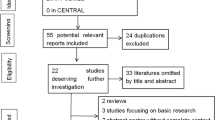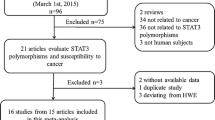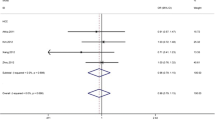Abstract
Purpose
For decades of years, hundreds of candidate gene-based association studies explored the relationship between single nucleotide polymorphisms (SNPs) and hepatocellular carcinoma (HCC). There was no systematic review summarized the results of these association studies of candidate SNPs and HCC to date. In order to summarize the results of the association studies, we conducted a concise systematic review.
Methods
By searching Pubmed database before October 2010, we reviewed all the association studies about candidate SNPs and HCC. If the eligible study number on a given SNP was more than three, we conducted a meta-analysis. We reported here only the overall positive-association results with statistical significance and evaluated the reliability of the associations by using false-positive report probability (FPRP) analysis and the Venice guidelines on genetic epidemiology studies.
Results
Six SNPs of five genes (rs1800562 of HFE, rs17868323 and rs11692021 of UGT1A7, rs2279744 of MDM2, rs1143627 of IL-1B, and rs4880 of MnSOD) showed overall significant associations with HCC. The eligible number of the studies varied from three to nine. Two SNPs (rs1800562 of HFE and rs2279744 of MDM2) passed the FPRP threshold (FPRP < 0.20). According to the Venice guidelines, the associations between the two SNPs (rs1800562 and rs2279744) and HCC were of moderate evidence.
Conclusions
Two SNPs (rs1800562 of HFE and rs2279744 of MDM2) were associated with HCC with moderate epidemiological evidence and deserve further study and additional biological and clinical assessment.






Similar content being viewed by others
References
Akkiz H, Bayram S et al (2009) G-308A TNF-alpha polymorphism is associated with an increased risk of hepatocellular carcinoma in the Turkish population: case-control study. Cancer Epidemiol 33(3–4):261–264
Akkiz H, Sumbul AT et al (2010) MDM2 promoter polymorphism is associated with increased susceptibility to hepatocellular carcinoma in Turkish population. Cancer Epidemiol 34(4): 448–452
Ballardini G, Groff P et al (1994) Increased risk of hepatocellular carcinoma development in patients with cirrhosis and with high hepatocellular proliferation. J Hepatol 20(2):218–222
Beckman LE, Hagerstrand I et al (2000) Interaction between haemochromatosis and transferrin receptor genes in hepatocellular carcinoma. Oncology 59(4):317–322
Boige V, Castera L et al (2003) Lack of association between HFE gene mutations and hepatocellular carcinoma in patients with cirrhosis. Gut 52(8):1178–1181
Borentain P, Gerolami V et al (2007) DNA-repair and carcinogen-metabolising enzymes genetic polymorphisms as an independent risk factor for hepatocellular carcinoma in Caucasian liver-transplanted patients. Eur J Cancer 43(17):2479–2486
Bougeard G, Baert-Desurmont S et al (2006) Impact of the MDM2 SNP309 and p53 Arg72Pro polymorphism on age of tumour onset in Li-Fraumeni syndrome. J Med Genet 43(6):531–533
Bruzzi P, Green SB et al (1985) Estimating the population attributable risk for multiple risk factors using case-control data. Am J Epidemiol 122(5):904–914
Cauza E, Peck-Radosavljevic M et al (2003) Mutations of the HFE gene in patients with hepatocellular carcinoma. Am J Gastroenterol 98(2):442–447
Chen CJ, Chen DS (2002) Interaction of hepatitis B virus, chemical carcinogen, and genetic susceptibility: multistage hepatocarcinogenesis with multifactorial etiology. Hepatology 36(5):1046–1049
Chen CC, Yang SY et al (2005) Association of cytokine and DNA repair gene polymorphisms with hepatitis B-related hepatocellular carcinoma. Int J Epidemiol 34(6):1310–1318
Coussens LM, Werb Z (2002) Inflammation and cancer. Nature 420(6917):860–867
Dharel N, Kato N et al (2006) MDM2 promoter SNP309 is associated with the risk of hepatocellular carcinoma in patients with chronic hepatitis C. Clin Cancer Res 12(16):4867–4871
Dupont WD, Plummer WD Jr (1990) Power and sample size calculations. A review and computer program. Control Clin Trials 11(2):116–128
Dupont WD, Plummer WD Jr (1998) Power and sample size calculations for studies involving linear regression. Control Clin Trials 19(6):589–601
Egger M, Davey Smith G et al (1997) Bias in meta-analysis detected by a simple, graphical test. BMJ 315(7109):629–634
Ellervik C, Birgens H et al (2007) Hemochromatosis genotypes and risk of 31 disease endpoints: meta-analyses including 66, 000 cases and 226, 000 controls. Hepatology 46(4):1071–1080
El-Omar EM, Carrington M et al (2000) Interleukin-1 polymorphisms associated with increased risk of gastric cancer. Nature 404(6776):398–402
Ezzikouri S, El Feydi AE et al (2008a) Genetic polymorphism in the manganese superoxide dismutase gene is associated with an increased risk for hepatocellular carcinoma in HCV-infected Moroccan patients. Mutat Res 649(1–2):1–6
Ezzikouri S, El Feydi AE et al (2008b) Prevalence of common HFE and SERPINA1 mutations in patients with hepatocellular carcinoma in a Moroccan population. Arch Med Res 39(2):236–241
Ezzikouri S, El Feydi AE et al (2009) MDM2 SNP309T > G polymorphism and risk of hepatocellular carcinoma: a case-control analysis in a Moroccan population. Cancer Detect Prev 32(5–6):380–385
Guillemette C (2003) Pharmacogenomics of human UDP-glucuronosyltransferase enzymes. Pharmacogenomics J 3(3):136–158
Hellerbrand C, Poppl A et al (2003) HFE C282Y heterozygosity in hepatocellular carcinoma: evidence for an increased prevalence. Clin Gastroenterol Hepatol 1(4):279–284
Higgins JP, Thompson SG (2002) Quantifying heterogeneity in a meta-analysis. Stat Med 21(11):1539–1558
Hsieh JK, Chan FS et al (1999) RB regulates the stability and the apoptotic function of p53 via MDM2. Mol Cell 3(2):181–193
Imaizumi T, Higaki Y et al (2009) Interaction between cytochrome P450 1A2 genetic polymorphism and cigarette smoking on the risk of hepatocellular carcinoma in a Japanese population. Carcinogenesis 30(10):1729–1734
Ioannidis JP, Boffetta P et al (2008) Assessment of cumulative evidence on genetic associations: interim guidelines. Int J Epidemiol 37(1):120–132
Jin F, Qu LS et al (2009) Association between the methylenetetrahydrofolate reductase C677T polymorphism and hepatocellular carcinoma risk: a meta-analysis. Diagn Pathol 4:39
Jin F, Qu LS et al (2010) Association between C282Y and H63D mutations of the HFE gene with hepatocellular carcinoma in European populations: a meta-analysis. J Exp Clin Cancer Res 29:18
Kong SY, Ki CS et al (2008) UGT1A7 haplotype is associated with an increased risk of hepatocellular carcinoma in hepatitis B carriers. Cancer Sci 99(2):340–344
Lain S, Lane D (2003) Improving cancer therapy by non-genotoxic activation of p53. Eur J Cancer 39(8):1053–1060
Lau J, Ioannidis JP et al (1997) Quantitative synthesis in systematic reviews. Ann Intern Med 127(9):820–826
Lauret E, Rodriguez M et al (2002) HFE gene mutations in alcoholic and virus-related cirrhotic patients with hepatocellular carcinoma. Am J Gastroenterol 97(4):1016–1021
Leu JD, Lin IF et al (2009) Association between MDM2-SNP309 and hepatocellular carcinoma in Taiwanese population. World J Gastroenterol 15(44):5592–5597
Michael D, Oren M (2003) The p53-Mdm2 module and the ubiquitin system. Semin Cancer Biol 13(1):49–58
Migita K, Maeda Y et al (2007) Polymorphisms of interleukin-1beta in Japanese patients with hepatitis B virus infection. J Hepatol 46(3):381–386
Nahon P, Sutton A et al (2005) Genetic dimorphism in superoxide dismutase and susceptibility to alcoholic cirrhosis, hepatocellular carcinoma, and death. Clin Gastroenterol Hepatol 3(3):292–298
Nahon P, Sutton A et al (2007) Manganese superoxide dismutase dimorphism and iron overload, hepatocellular carcinoma, and death in hepatitis C virus-infected patients. Clin Gastroenterol Hepatol 5(5):630–635
Nahon P, Sutton A et al (2008) Liver iron, HFE gene mutations, and hepatocellular carcinoma occurrence in patients with cirrhosis. Gastroenterology 134(1):102–110
Nahon P, Sutton A et al (2009) Myeloperoxidase and superoxide dismutase 2 polymorphisms comodulate the risk of hepatocellular carcinoma and death in alcoholic cirrhosis. Hepatology 50(5):1484–1493
Ognjanovic S, Yuan JM et al (2009) Genetic polymorphisms in the cytokine genes and risk of hepatocellular carcinoma in low-risk non-Asians of USA. Carcinogenesis 30(5):758–762
Oh SS, Chang SC et al (2010) Single nucleotide polymorphisms of 8 inflammation-related genes and their associations with smoking-related cancers. Int J Cancer 127(9):2169–2182
Okamoto K, Ishida C et al (2010) The genotypes of IL-1 beta and MMP-3 are associated with the prognosis of HCV-related hepatocellular carcinoma. Intern Med 49(10):887–895
Parkin DM (2001) Global cancer statistics in the year 2000. Lancet Oncol 2(9):533–543
Ropero P, Briceno O et al (2007) The H63D mutation in the HFE gene is related to the risk of hepatocellular carcinoma. Rev Esp Enferm Dig 99(7):376–381
Rossi L, Leveri M et al (2003) Genetic polymorphisms of steroid hormone metabolizing enzymes and risk of liver cancer in hepatitis C-infected patients. J Hepatol 39(4):564–570
Sakamoto T, Higaki Y et al (2008) Interaction between interleukin-1beta -31T/C gene polymorphism and drinking and smoking habits on the risk of hepatocellular carcinoma among Japanese. Cancer Lett 271(1):98–104
Shi WJ, Chen H et al (2005) Association of mutations of HFE gene and hepatocellular carcinoma following chronic hepatitis B. Zhonghua Gan Zang Bing Za Zhi 13(9):682–684
Silvestri L, Sonzogni L et al (2003) CYP enzyme polymorphisms and susceptibility to HCV-related chronic liver disease and liver cancer. Int J Cancer 104(3):310–317
Stucker I, Loriot MA et al (2007) UDP-glucuronosyltransferase UGT1A7 genetic polymorphisms in hepatocellular carcinoma: a differential impact according to seropositivity of HBV or HCV markers? BMC Cancer 7:214
Sun L, Konig IR et al (2009) Manganese superoxide dismutase (MnSOD) polymorphism, alcohol, cigarette smoking and risk of oesophageal cancer. Alcohol Alcohol 44(4):353–357
Sutton A, Imbert A et al (2005) The manganese superoxide dismutase Ala16Val dimorphism modulates both mitochondrial import and mRNA stability. Pharmacogenet Genomics 15(5):311–319
Sutton A, Nahon P et al (2006) Genetic polymorphisms in antioxidant enzymes modulate hepatic iron accumulation and hepatocellular carcinoma development in patients with alcohol-induced cirrhosis. Cancer Res 66(5):2844–2852
Tanabe KK, Lemoine A et al (2008) Epidermal growth factor gene functional polymorphism and the risk of hepatocellular carcinoma in patients with cirrhosis. JAMA 299(1):53–60
Thakkinstian A, McElduff P et al (2005) A method for meta-analysis of molecular association studies. Stat Med 24(9):1291–1306
Tseng CS, Tang KS et al (2005) UDP-glucuronosyltransferase 1A7 genetic polymorphisms are associated with hepatocellular carcinoma risk and onset age. Am J Gastroenterol 100(8):1758–1763
Vogel A, Kneip S et al (2001) Genetic link of hepatocellular carcinoma with polymorphisms of the UDP-glucuronosyltransferase UGT1A7 gene. Gastroenterology 121(5):1136–1144
Wacholder S, Chanock S et al (2004) Assessing the probability that a positive report is false: an approach for molecular epidemiology studies. J Natl Cancer Inst 96(6):434–442
Wang Y, Kato N et al (2004) UDP-glucuronosyltransferase 1A7 genetic polymorphisms are associated with hepatocellular carcinoma in japanese patients with hepatitis C virus infection. Clin Cancer Res 10(7):2441–2446
Wang S, Wang F et al (2009) Association between manganese superoxide dismutase (MnSOD) Val-9Ala polymorphism and cancer risk - A meta-analysis. Eur J Cancer 45(16):2874–2881
Willis G, Bardsley V et al (2005) Hepatocellular carcinoma and the penetrance of HFE C282Y mutations: a cross sectional study. BMC Gastroenterol 5:17
Yoon YJ, Chang HY et al (2008) MDM2 and p53 polymorphisms are associated with the development of hepatocellular carcinoma in patients with chronic hepatitis B virus infection. Carcinogenesis 29(6):1192–1196
Yoshimura A (2006) Signal transduction of inflammatory cytokines and tumor development. Cancer Sci 97(6):439–447
Yuan JM, Lu SC et al (2007) Genetic polymorphisms in the methylenetetrahydrofolate reductase and thymidylate synthase genes and risk of hepatocellular carcinoma. Hepatology 46(3):749–758
Yuan X, Zhou G et al (2008) Lack of association between the functional polymorphisms in the estrogen-metabolizing genes and risk for hepatocellular carcinoma. Cancer Epidemiol Biomarkers Prev 17(12):3621–3627
Zintzaras E, Ioannidis JP (2005) Heterogeneity testing in meta-analysis of genome searches. Genet Epidemiol 28(2):123–137
Acknowledgments
This study was financially supported by National Basic Research Program of China (2007CB936000), Major National Science and Technology Projects (2009ZX10004-301, 2008ZX10002-017), Shanghai Science and Technology Commission (10410709400, 10411950100), Shanghai Talent Development Foundation (2009-035), and National Nature Science Foundation of China (No. 30772505 & No. 30872503).
Conflict of interest
All authors declare that we have no conflict of interest.
Author information
Authors and Affiliations
Corresponding author
Rights and permissions
About this article
Cite this article
Jin, F., Xiong, WJ., Jing, JC. et al. Evaluation of the association studies of single nucleotide polymorphisms and hepatocellular carcinoma: a systematic review. J Cancer Res Clin Oncol 137, 1095–1104 (2011). https://doi.org/10.1007/s00432-010-0970-0
Received:
Accepted:
Published:
Issue Date:
DOI: https://doi.org/10.1007/s00432-010-0970-0




